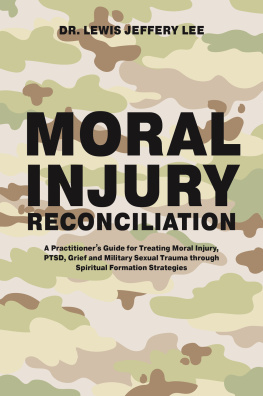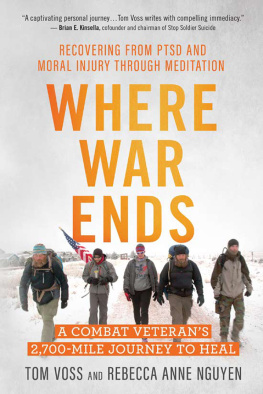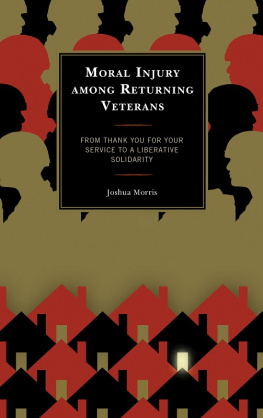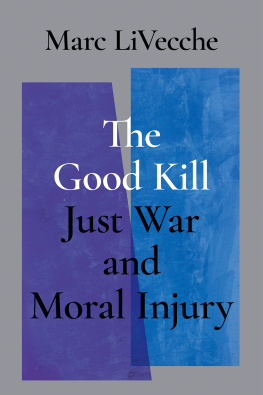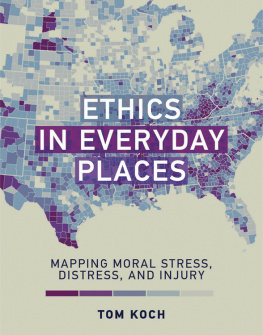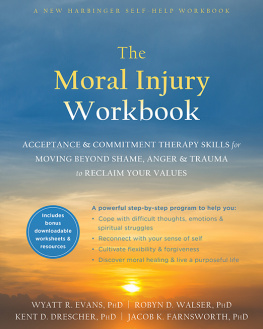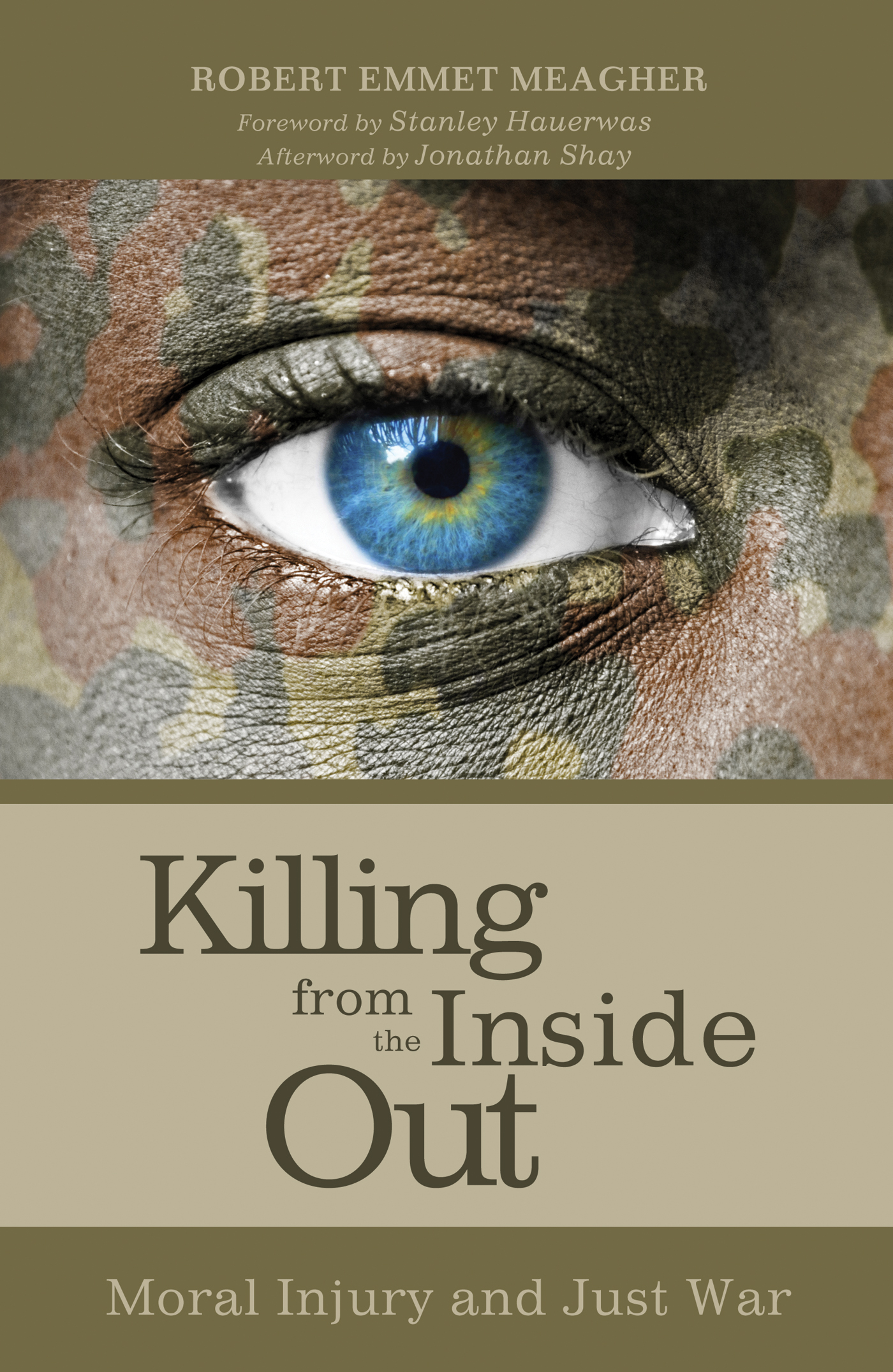
For more than years I have been working with former combatants in different parts of the world, grappling with the profound human cost of their involvement in war/violent political conflict. The dominant discourses of post traumatic stress disorder and just war really do not capture the deep wounding, the soul fragmentation, and inner darkness that many of them continue to be haunted by, especially those who come from religious backgrounds. Meaghers book comes like a much needed breath of fresh airshining sensitive light on this darkness; pointing with nuanced language to the depth of human wounding in war; highlighting in particular the complicity of the just war tradition in this inner injuring and the difficulties of healing. In this really important book, Meagher combines his own practical wisdom from many years of working with combat veterans with decades of high quality scholarship. As a reflective practitioner I strongly recommend this book to anyone truly interested in transforming the human cost of war.
Wilhelm Verwoerd
International peace and reconciliation worker, Director of Beyond Walls, Cape Town Area, South Africa. His books include: My Winds of Change (foreword by Nelson Mandela) and Journey through Conflict Trail Guide .
Professor Meagher has steered us through minefields of thought on just war and justified killing, sacrifice and collateral damage, moral injury and its consequences on individuals and society. His expertise in truth and justice, and extensive experience interviewing individuals and writing about moral injury serve to sharpen our understanding as we help our veterans to wellness. Meagher has written the essential rebuttal to Just War theory. This book should be read by scholars, warriors, clergy, politicians, and anyone caring for those suffering from moral injury related to military service. It is an exceptional tour of Western thought on war and killing, and their justification by our military, religious, and political leaders.
Kimberly May, MD
Col (retired), United States Air Force, Medical Corps, currently staff physician, Veterans Administration Medical Center, Leeds, MA.
The soul of the United States is infected by its addiction to unending war. The suicide rate among soldiers and war veterans has reached epidemic heights. Bob Meaghers seminal and timely work, with its reach from antiquity to today, shows that there never was a just war that would leave its participants unscarred. We live with the terrible consequences of a process from CE when Christian values began to be transposed with imperial values. None of us are hardwired for war, so when we kill each other there will be moral and spiritual injury no matter how justified the war may be.
Rev. Michael Lapsley
Founder-Director, Institute for Healing of Memories, Cape Town, South Africa, and author of Redeeming the Past: My Journey from Freedom Fighter to Healer .
Under the skilled hand of this master of the classics, the ancient Greeks cross the eons to bring their wisdom into our time, on issues of vital importancewar and its trail in the souls of killers and their communities. This is the resource for understanding how the religion of the Prince of Peace came to support war. Meagher brings us leaders of the early Christian church, showing us how Christianity came to excuse, if not promote, the industrialized and anonymous killing that war has become. The able professor also weaves in the struggles of current military veterans who struggle for inner peace having done what they were told to do. He manages all this in a manner that gives not despair, but life!
Amy Blumenshine
Diaconal Minister, Evangelical Lutheran Church in America, founder of the Coming Home Collaborative, and a co-author of Welcome Them HomeHelp Them Heal .
In the field of conflict transformation and peace-building there is a recognized gap between grassroots practitioners who have lived through violent conflict and are working with its legacy, and academics who are considered to be experts while lacking significant on-the-ground experience. Bob Meagher is one scholar who bridges this gulf with integrity, clarity, compassion, and challenge. Killing from the Inside Out is a brilliant example of his ability to chart the development of Just War Theory and consider it in the light of the lived experience of human beings sent into battle across the centuries. He doesnt swamp the reader with the vast scope of his personal knowledge but helps us trace easily and engagingly the attitudes to violent conflict and its moral status from the time of the wars of ancient Greece, via the emergence and rise of Christianity during the time of Imperial Rome and forward through the writings of key figures to the present day. He draws fascinating, thought-provoking, and some might say, disturbing parallels between war-making and love-making from a male perspective. He takes seriously the understanding of service personnel deployed as combatants to conflict zones across the world, whose experience illustrates why Just War Theory is dead. I found this book gripping, illuminating, and prophetic. In a so-called civilized world where we continue to accept all too easily the killing of innocents in war, and the sometimes devastating long-term impact on those young people we send into battle to kill on our behalf, it is utterly timely.
Ruth Scott
An Anglican priest, a producer and presenter for the BBC in London, a renowned international peace and conflict resolution worker, and the author of many books, including one on the conflict in Northern Ireland that was made into a feature film starring Liam Neeson.
Truth often hides, Robert Meagher reminds us, in Killing from the Inside Out , especially when the truth challenges our myths, for example, the myth that one can kill another human being and not be damaged by so doing. The truth is no one leaves the battlefield unwounded. Killing wounds the soul. But what if its a just war? Meagher argues convincingly that to put the adjective just in front of the word war is self-deception.
Jim Forest
Co-founded the Catholic Peace Fellowship in 1964 and from 1977 through 1988 was Secretary General of the International Fellowship of Reconciliation. Currently he serves as International Secretary of the Orthodox Peace Fellowship. His books include The Road to Emmaus: Pilgrimage as a Way of Life, Ladder of the Beatitudes, Praying with Icons, Living With Wisdom: A Biography of Thomas Merton, All Is Grace: A Biography of Dorothy Day, and Loving Our Enemies: Reflections on the Hardest Commandment.
Bob Meagher lays out a provocative argument: That just war, as a theory and set of principles to guide us in battle, is effectively dead. He tangles with the perverse assumption, passed down through the ages, that there is a just way of taking another persons life, that killing in wartime is somehow different from murder in peacetime. That just war originates in Christian theology, and was invoked in a speech by an American president accepting a Nobel Peace Prize, is even more puzzling. Meagher grapples with not just the collective moral crisis nations go through when they use violence to achieve political ends, but also how ex-soldiers grapple with their own consciences over their actions in the heat of battle, or what he calls moral injury. He comes at the subject not as a pacifist but as an ethicist, marshaling impressive evidence, from the works of St. Augustine to Camus, to make his case. The book recounts the harrowing stories of soldiers who struggle to cope with what theyve done in combat, what theyve seen, and the scars that stay with them in their postwar lives. Elegantly written and easily accessible to lay readershis prose unburdened by any military jargon or acronym-soup Killing From the Inside Out is an ideal read for anyone curious about American adventurism abroad, the future of civil-military relations, and the humanand moraltoll of war.


